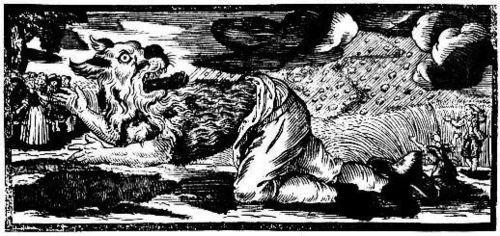Wolfnoun
The gray wolf, specifically all subspecies of the gray wolf (Canis lupus) that are not dingoes or dogs.
Wolfnoun
A man who makes amorous advances to many women.
Wolfnoun
(music) A wolf tone or wolf note.
Wolfnoun
One of the destructive, and usually hairy, larvae of several species of beetles and grain moths.
Wolfnoun
(figurative) Any very ravenous, rapacious, or destructive person or thing; especially, want; starvation.
Wolfnoun
A white worm, or maggot, which infests granaries.
Wolfnoun
(obsolete) An eating ulcer or sore. See lupus.
Wolfnoun
A willying machine.
Wolfverb
(transitive) To devour; to gobble; to eat (something) voraciously.
Wolfverb
To make amorous advances to many women; to hit on women; to cruise for sex.
Wolfverb
(intransitive) To hunt for wolves.
Wolfnoun
Any one of several species of wild and savage carnivores belonging to the genus Canis and closely allied to the common dog. The best-known and most destructive species are the European wolf (Canis lupus), the American gray, or timber, wolf (Canis occidentalis), and the prairie wolf, or coyote. Wolves often hunt in packs, and may thus attack large animals and even man.
Wolfnoun
One of the destructive, and usually hairy, larvæ of several species of beetles and grain moths; as, the bee wolf.
Wolfnoun
Fig.: Any very ravenous, rapacious, or destructive person or thing; especially, want; starvation; as, they toiled hard to keep the wolf from the door.
Wolfnoun
A white worm, or maggot, which infests granaries.
Wolfnoun
An eating ulcer or sore. Cf. Lupus.
Wolfnoun
The harsh, howling sound of some of the chords on an organ or piano tuned by unequal temperament.
Wolfnoun
A willying machine.
Wolfnoun
any of various predatory carnivorous canine mammals of North America and Eurasia that usually hunt in packs
Wolfnoun
Austrian composer (1860-1903)
Wolfnoun
German classical scholar who claimed that the Iliad and Odyssey were composed by several authors (1759-1824)
Wolfnoun
a man who is aggressive in making amorous advances to women
Wolfnoun
a cruelly rapacious person
Wolfverb
eat hastily;
Wolf
The wolf (Canis lupus), also known as the gray wolf or grey wolf, is a large canine native to Eurasia and North America. More than thirty subspecies of Canis lupus have been recognized, and gray wolves, as colloquially understood, comprise non-domestic/feral subspecies.
Werewolfnoun
(mythology) A person who is transformed or can transform into a wolf or a wolflike human, often said to transform during a full moon.
Werewolfnoun
A person transformed into a wolf in form and appetite, either temporarily or permanently, whether by supernatural influences, by witchcraft, or voluntarily; a lycanthrope. Belief in werewolves, formerly general, is not now extinct.
Werewolfnoun
a monster able to change appearance from human to wolf
Werewolf
In folklore, a werewolf (Old English: werwulf, ), or occasionally lycanthrope (Greek: λυκάνθρωπος lukánthrōpos, ), is a human with the ability to shapeshift into a wolf (or, especially in modern film, a therianthropic hybrid wolflike creature), either purposely or after being placed under a curse or affliction (often a bite or scratch from another werewolf) with the transformations occurring on the night of a full moon. Early sources for belief in this ability or affliction, called lycanthropy , are Petronius (27–66) and Gervase of Tilbury (1150–1228).








